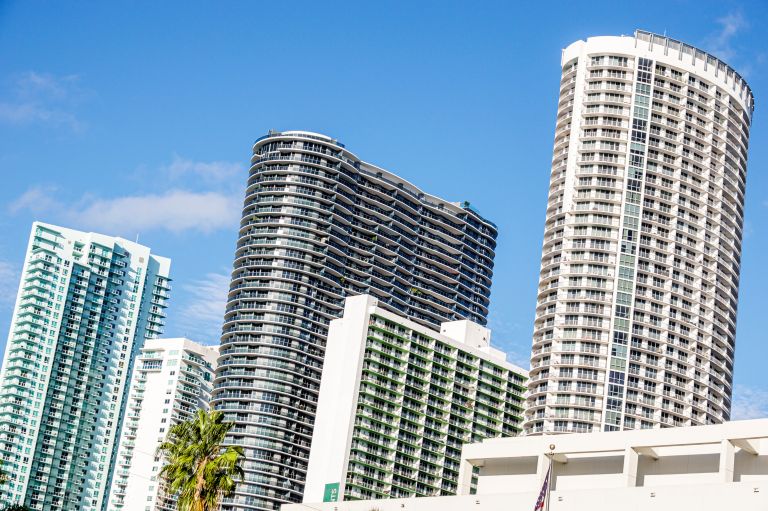Miami Fights to Break Ties With FTX, as Arena Curse Strikes Again

It is something of a rite of passage: A once-hot company’s name is removed from a major sports arena following its sudden and—for investors, employees and others—painful demise.
For FTX, that scene is playing out in south Florida along Biscayne Bay, where Miami-Dade County is pushing to end its arena naming-rights agreement with the failed cryptocurrency exchange.
Miami-Dade County has asked the judge in the FTX bankruptcy case to terminate the 19-year, $135 million deal so it can find a new sponsor for the arena where the NBA’s Miami Heat play. The county’s lawyers argue FTX has breached terms of the deal by running afoul of laws governing financial exchanges and the sooner the agreement ends, the smaller Miami-Dade’s claim will be in the bankruptcy case.
“These breaches appear to have been repeated, recurring and incurable,” the county lawyers wrote recently in a motion for relief.
They pointed to investigations by the Justice Department, the Securities and Exchange Commission and the Commodity Futures Trading Commission, as well as former FTX CEO
Sam Bankman-Fried
‘s admissions on Twitter that customer funds were mismanaged, and the current chief executive’s description of an unprecedented mess that he has been assigned to unwind.
The liquidating executive, John J. Ray III, has been called upon for decades to navigate so-called free-fall bankruptcies. Sports venues are often involved.
On behalf of creditors he ran the reorganized Enron Corp., which had its name removed from the Houston Astros ballpark after the energy giant collapsed in 2001. Mr. Ray also steered Fruit of the Loom Inc. through its 1999 bankruptcy, after which its Pro Player brand name was stripped from Miami’s football stadium.
There is said to be a stadium-name curse. The National Car Rental Center, Adelphia Coliseum, Chesapeake Energy Arena, Trans World Dome, PSINet Stadium, MCI Center: Each was renamed following insolvency or worse.
Getting its name on an NBA arena beamed FTX into millions of households around the world and seemed to vault the upstart into the upper echelon of corporate America, alongside airlines and banks.
Enron’s name was removed from the Houston Astros ballpark after the energy giant collapsed in 2001.
Photo:
BRETT COOMER/ASSOCIATED PRESS
It was the start of a sponsorship binge that put FTX’s bar-chart logo where the potential customer would see it: a Formula One racing car, the floor of NBA arenas, esports events, a chess tournament. FTX patches were sewn to the shirts of Major League Baseball’s umpires.
Crypto trading was taking off when Miami-Dade shopped naming rights for the county-owned property, which had been called American Airlines Arena since opening in 1999.
Executives from a Cleveland firm that brokers naming deals told Miami-Dade officials in 2018 that a new sponsorship would pay at least three times the $2.1 million a year that American had been paying, according to county records.
The county hired the firm, Superlative Group, to find one. Superlative sounded out more than 100 companies and negotiated with several before landing on FTX, according to the records.
Miami-Dade’s Office of the Inspector General looked into FTX and produced a 42-page dossier on the company, its affiliates and top shareholders before the county commission voted on the deal.
Investigators pulled FTX filings from secretaries of state, scoured social-media sites and dug up last-known addresses for Mr. Bankman-Fried and his inner circle—though they couldn’t find many.
“The review is limited due to the amount of time we had,” Inspector General Felix Jimenez wrote to Miami-Dade Mayor
Daniella Levine Cava.
Mr. Jimenez said his office was concerned with reputational risk and didn’t vet FTX’s finances, under the impression another department was doing that.
FTX presented unaudited financials showing $42.7 million in equity and $27.3 million in cash and equivalents. “No substantial concerns result from the review other than the firm has not been in business for long,” Ms. Levine Cava wrote to commissioners ahead of the vote in March 2021.
The firm’s short history worried some commissioners. At one hearing, commissioner Rebeca Sosa worried whether FTX had enough cash to live up to its end of the bargain, and whether unaudited financials were reliable. “Will they be able to meet the 19-year commitment?” she said.
Despite the apprehension, the deal was approved in March 2021. After the Heat’s $40 million cut and Superlative’s $5.2 million fee, the county was owed about $90 million, which was pledged to fight gun violence.
SHARE YOUR THOUGHTS
What are your views on naming rights for arenas? Join the conversation below.
A few weeks later, at a virtual conference, Mr. Bankman-Fried said he made the arena deal because of Miami’s embrace of crypto and dismissed doubts about making good on nearly two decades of payments.
“It’s been a pretty good year for us, to the point where frankly we don’t need to rely on the other 18 years to have the funds,” he said.
FTX paid $14 million last year and $5.5 million in 2022. County records show the money was disbursed among commission districts and used to buy ballistic shields and electric patrol bikes for police, and fund youth summer camps and athletic clubs.
The next payment—$5.5 million—is due Jan. 1. If the deal isn’t broken off by then, county lawyers say that amount will be added to the $17 million early termination fee that Miami-Dade has claimed in bankruptcy court.
Write to Ryan Dezember at [email protected] and Deborah Acosta at [email protected]
Copyright ©2022 Dow Jones & Company, Inc. All Rights Reserved. 87990cbe856818d5eddac44c7b1cdeb8


